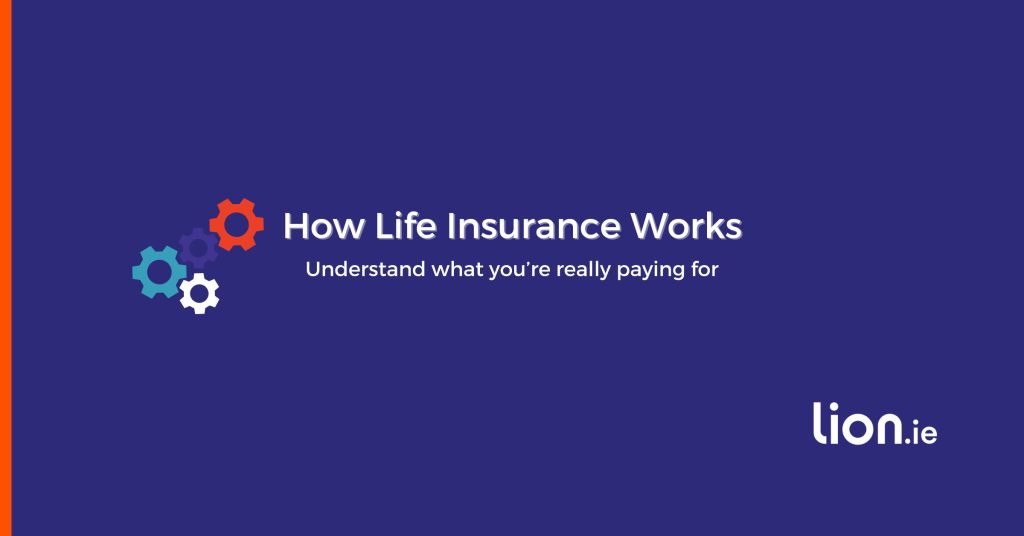
Editor’s note: First published 2020 | Refreshed November 2025 with updated Irish claim data, clearer step-by-step process and real-life examples.
10-second summary: You pay a small monthly premium so your family gets a big, tax-free payout if you die during the term. Insurers pool everyone’s payments and invest them carefully — that’s how the maths works and why over 95 % of Irish life-insurance claims are paid every year.
Most people see life insurance as paperwork — sign a form, pay a bill, forget about it.
But really it’s a protective bubble around your family finances, keeping them safe when you no longer can.

When you see it that way, life insurance stops being a chore and starts feeling like what it truly is: a selfless act of love.
Home insurance protects your house.
Car insurance protects your car.
Life insurance protects your people — the ones who rely on your income to live their lives.
You work, get paid, and that money covers the mortgage, groceries, Netflix, football boots… all the ordinary things that make life ordinary. If that income disappears, bills don’t.
Life insurance steps in so your family doesn’t have to rely on one income (or maybe only state benefits if your other half is at home).
When you die within the policy term, the insurer pays your chosen sum assured as a tax-free lump sum. That payout lets your partner clear the mortgage, keep the lights on, and give the kids time to breathe and rebuild.
Life insurance pays out if you die during the policy term, regardless of the cause.
That includes death from illness, natural causes, and accidents. There’s no separate “accident policy” needed once your cover is in place.
The only real exceptions are things like suicide in the early years of a policy or non-disclosure on the application. Otherwise, if the policy has issued and premiums are up to date, a valid claim is paid.
Take Aoife (38) and Mark (40) in Tullamore — two kids under 10 and a €285 k mortgage.
They each take out €400 k in term life cover for 25 years, costing roughly €38 a month each and a basic mortgage protection policy for €21.
If either dies during that term, the mortgage is cleared and the surviving partner gets a €400 k payout — enough to replace a few years’ income.
Without life insurance? The survivor would face a massive drop in household income overnight.
Life insurance is the difference between stability and struggle.
Many people pay a little so a few families can get a lot when they need it most.
Underwriting isn’t a trap — it’s just a risk assessment. You fill out a medical questionnaire; the insurer decides:
Each Irish insurer takes a different view on medical conditions — one may load a policy heavily for a certain health issue, while another won’t.
That’s why brokers like us exist — we know which underwriter suits your condition.
Yes — but it’s not automatic.
If your health improves after you take out a policy, you can ask the insurer to review your terms. They’ll reassess you as if you were applying again today.
Important: Premiums don’t reduce automatically. You must request a review and you’ll complete a fresh medical questionnaire.
If your health has improved and you’re unsure whether it’s worth revisiting your cover, send me the details and I’ll tell you straight.
They actually hate refusing claims.
Every denial risks bad PR, complaints and a Central Bank audit.
It’s far better business to pay valid claims and promote trust in the system.
To see how often insurers actually pay out, check our life insurance claims guide.

Proof: Irish insurers pay 95–98 % of life claims each year. Refusals usually come from non-disclosure — “forgetting” a medical detail that should’ve been on the form.
Be honest and you’re covered.
You might wonder what happens if your insurer itself ran into trouble. The short answer? You’re still protected.
All Irish life insurance companies are tightly regulated by the Central Bank of Ireland. They must keep far more money in reserve than they ever expect to pay out — a kind of financial safety cushion that ensures claims can always be covered.
In plain English: if you’ve paid your premiums, your policy and payout are ring-fenced from any wider company issues. No major Irish life insurer has ever gone bust in modern times, and your policy would still be honoured even if one did.
If you’d like to dig deeper, you can read the official Policyholder Protection Guide (PDF) from Brokers Ireland — but honestly, the key point is that your money and your family’s payout are safe.
When a policyholder dies, the family contacts either their broker or the insurer directly.
Insurers must acknowledge the claim within five business days under Central Bank rules.
Once they receive the death certificate and medical report, most Irish companies complete payment within ten working days for a straightforward death claim.
It can be one of the smoothest claims processes in financial services — a tiny bit of paperwork for a life-changing cheque.
What can stall the process is having to wait for Grant of Probate. Here’s how to avoid it:
Take Ann and Barry.
Ann is the main earner, so she takes out a single life insurance policy but doesn’t name Barry as a beneficiary.
When Ann passes, the insurer will require a Grant of Probate before they pay out.
If Barry were named as the policy owner, the insurer could pay out immediately.
This isn’t a full buyer’s guide — that’s over at Life Insurance Explained — but here’s the overview:
Policies aren’t set in stone. Look for extras like:
| Example Cover | Age | Monthly Cost (Non-Smoker) |
|---|---|---|
| €250k / 20 yrs | 30 | €13–€16 / mo |
| €250k / 25 yrs | 40 | €21–€25 / mo |
| €250k / 25 yrs | 50 | €45–€55 / mo |
Premiums depend on age, cover, term, health, and whether you smoke.
Whole-of-life can cost 10–15 × more because a payout is guaranteed no matter when you die.
Put simply: banks sell; brokers shop. Guess which usually gets you a better deal.
We’re paid by the insurer through a standard commission, not by you.
Our duty is still to recommend the policy that best fits your circumstances and budget — we don’t charge extra or favour one provider over another.
It’s a rare case of everyone winning: you get choice, and we get paid for doing the legwork.
We’re the only Irish broker that publishes these figures — because transparency matters.
Here’s how our life and protection business was placed across insurers last year:
| Insurer | % of Total Business (2024) |
|---|---|
| Zurich | 36% |
| Royal London | 34% |
| Aviva | 22% |
| New Ireland | 5% |
| Irish Life | 3% |
| Total | 100% |
Figures based on total life, mortgage protection, and income protection business arranged by Lion.ie in 2024.
It’s proof that we place policies with the right insurer, not just the cheapest one
A quick rule of thumb: enough to replace your income until your youngest child is financially independent (about 25 years).
(Net monthly income – ½ mortgage) × 0.8 × (25 – age of youngest child) 🧠
Or skip the maths and let me calculate it for you.
You’ll get a personal recommendation based on your family and budget — not Brian from Accounts’ best guess.
Insurers are fair but not psychic.
If you leave out medical info — a past operation, medication, or smoking habit — it can void a claim.
Tell the truth, even about awkward stuff.
It stays confidential and helps us place you with the right underwriter first time round.
When you strip away the jargon, life insurance is simple: you buy peace of mind.
You hope you never use it, but if the worst happens, your family stays afloat instead of drowning in bills.
Get the policy that quietly protects everything you’ve built — not the cheapest, not the flashiest, just the right fit for your family.
Ready to protect your family properly?
👉 Get instant quotes | Prefer a personal recommendation? Complete our short questionnaire

Written by Nick McGowan, QFA RPA APA
Nick is a qualified financial advisor and founder of Lion.ie, an independent Irish life insurance and income protection brokerage based in Tullamore.
He’s been helping people get fair, transparent cover for over 15 years — and was named Protection Broker of the Year 2022.
As Ireland's leading life insurance broker, we specialise in comparing the rates and policies from the top five Irish life insurance providers and offering the very best value quotes to suit the individual needs of our clients. Our expertise lies in finding a suitable insurance plan for those with specific needs, be it a particular illness, occupation or claim history, we've got you covered in every sense!
Watch our video